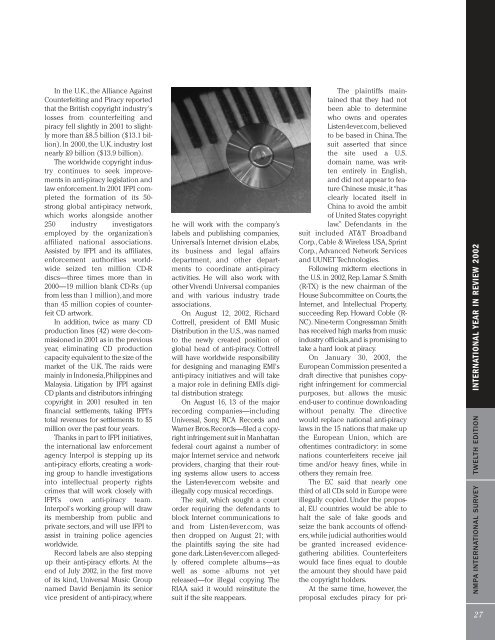NMPA_International_Survey_12th_Edition
NMPA_International_Survey_12th_Edition
NMPA_International_Survey_12th_Edition
Create successful ePaper yourself
Turn your PDF publications into a flip-book with our unique Google optimized e-Paper software.
In the U.K., the Alliance Against<br />
Counterfeiting and Piracy reported<br />
that the British copyright industry's<br />
losses from counterfeiting and<br />
piracy fell slightly in 2001 to slightly<br />
more than £8.5 billion ($13.1 billion).<br />
In 2000, the U.K. industry lost<br />
nearly £9 billion ($13.9 billion).<br />
The worldwide copyright industry<br />
continues to seek improvements<br />
in anti-piracy legislation and<br />
law enforcement.In 2001 IFPI completed<br />
the formation of its 50-<br />
strong global anti-piracy network,<br />
which works alongside another<br />
250 industry investigators<br />
employed by the organization’s<br />
affiliated national associations.<br />
Assisted by IFPI and its affiliates,<br />
enforcement authorities worldwide<br />
seized ten million CD-R<br />
discs—three times more than in<br />
2000—19 million blank CD-Rs (up<br />
from less than 1 million),and more<br />
than 45 million copies of counterfeit<br />
CD artwork.<br />
In addition, twice as many CD<br />
production lines (42) were de-commissioned<br />
in 2001 as in the previous<br />
year, eliminating CD production<br />
capacity equivalent to the size of the<br />
market of the U.K. The raids were<br />
mainly in Indonesia,Philippines and<br />
Malaysia. Litigation by IFPI against<br />
CD plants and distributors infringing<br />
copyright in 2001 resulted in ten<br />
financial settlements, taking IFPI's<br />
total revenues for settlements to $5<br />
million over the past four years.<br />
Thanks in part to IFPI initiatives,<br />
the international law enforcement<br />
agency Interpol is stepping up its<br />
anti-piracy efforts, creating a working<br />
group to handle investigations<br />
into intellectual property rights<br />
crimes that will work closely with<br />
IFPI’s own anti-piracy team.<br />
Interpol's working group will draw<br />
its membership from public and<br />
private sectors, and will use IFPI to<br />
assist in training police agencies<br />
worldwide.<br />
Record labels are also stepping<br />
up their anti-piracy efforts. At the<br />
end of July 2002, in the first move<br />
of its kind, Universal Music Group<br />
named David Benjamin its senior<br />
vice president of anti-piracy, where<br />
he will work with the company’s<br />
labels and publishing companies,<br />
Universal’s Internet division eLabs,<br />
its business and legal affairs<br />
department, and other departments<br />
to coordinate anti-piracy<br />
activities. He will also work with<br />
other Vivendi Universal companies<br />
and with various industry trade<br />
associations.<br />
On August 12, 2002, Richard<br />
Cottrell, president of EMI Music<br />
Distribution in the U.S., was named<br />
to the newly created position of<br />
global head of anti-piracy. Cottrell<br />
will have worldwide responsibility<br />
for designing and managing EMI's<br />
anti-piracy initiatives and will take<br />
a major role in defining EMI’s digital<br />
distribution strategy.<br />
On August 16, 13 of the major<br />
recording companies—including<br />
Universal, Sony, RCA Records and<br />
Warner Bros.Records—filed a copyright<br />
infringement suit in Manhattan<br />
federal court against a number of<br />
major Internet service and network<br />
providers, charging that their routing<br />
systems allow users to access<br />
the Listen4ever.com website and<br />
illegally copy musical recordings.<br />
The suit, which sought a court<br />
order requiring the defendants to<br />
block Internet communications to<br />
and from Listen4ever.com, was<br />
then dropped on August 21; with<br />
the plaintiffs saying the site had<br />
gone dark.Listen4ever.com allegedly<br />
offered complete albums—as<br />
well as some albums not yet<br />
released—for illegal copying. The<br />
RIAA said it would reinstitute the<br />
suit if the site reappears.<br />
The plaintiffs maintained<br />
that they had not<br />
been able to determine<br />
who owns and operates<br />
Listen4ever.com, believed<br />
to be based in China.The<br />
suit asserted that since<br />
the site used a U.S.<br />
domain name, was written<br />
entirely in English,<br />
and did not appear to feature<br />
Chinese music,it “has<br />
clearly located itself in<br />
China to avoid the ambit<br />
of United States copyright<br />
law.” Defendants in the<br />
suit included AT&T Broadband<br />
Corp., Cable & Wireless USA, Sprint<br />
Corp., Advanced Network Services<br />
and UUNET Technologies.<br />
Following midterm elections in<br />
the U.S. in 2002, Rep. Lamar S. Smith<br />
(R-TX) is the new chairman of the<br />
House Subcommittee on Courts,the<br />
Internet, and Intellectual Property,<br />
succeeding Rep. Howard Coble (R-<br />
NC). Nine-term Congressman Smith<br />
has received high marks from music<br />
industry officials,and is promising to<br />
take a hard look at piracy.<br />
On January 30, 2003, the<br />
European Commission presented a<br />
draft directive that punishes copyright<br />
infringement for commercial<br />
purposes, but allows the music<br />
end-user to continue downloading<br />
without penalty. The directive<br />
would replace national anti-piracy<br />
laws in the 15 nations that make up<br />
the European Union, which are<br />
oftentimes contradictory: in some<br />
nations counterfeiters receive jail<br />
time and/or heavy fines, while in<br />
others they remain free.<br />
The EC said that nearly one<br />
third of all CDs sold in Europe were<br />
illegally copied. Under the proposal,<br />
EU countries would be able to<br />
halt the sale of fake goods and<br />
seize the bank accounts of offenders,while<br />
judicial authorities would<br />
be granted increased evidencegathering<br />
abilities. Counterfeiters<br />
would face fines equal to double<br />
the amount they should have paid<br />
the copyright holders.<br />
At the same time, however, the<br />
proposal excludes piracy for pri-<br />
<strong>NMPA</strong> INTERNATIONAL SURVEY TWELTH EDITION INTERNATIONAL YEAR IN REVIEW 2002<br />
27


